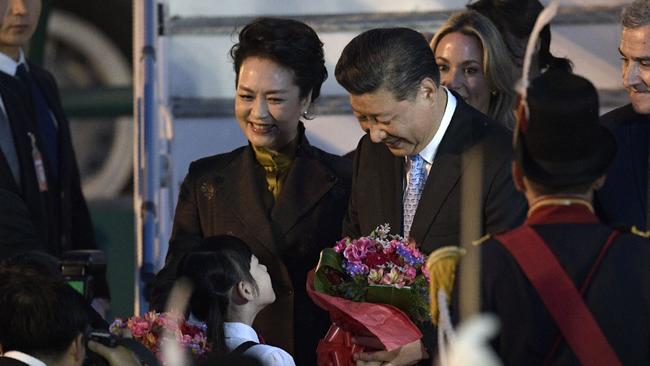G20: China warns US over warships in Taiwan Strait
Beijing has protested against America’s latest move to send warships through the Taiwan Strait.

China has protested against America’s latest move to send warships through the Taiwan Strait, urging the Trump administration to observe the one-China policy and avoid undermining peace in the region.
The US move comes after local elections on the island last weekend where the pro-independence Democratic Progressive Party of President Tsai Ing-wen suffered a resounding loss to the China-friendly Kuomintang, and ahead of tonight’s critical meeting at the G20 in Argentina between Chinese President Xi Jinping and US President Donald Trump.
Foreign Ministry spokesman Geng Shuang said late on Thursday that China had been closely monitoring the progress of US warships through the Taiwan Strait, warning that it regarded the handling of Taiwan as “the most important issue” in its relations with the US.
US guided missile destroyer the USS Stockdale and oiler USNS Pecos sailed through the strait on Monday, the third show of force by the US Navy this year in the strait between Taiwan and mainland China following passages in July and October.
“We have expressed our concern to the US side,” Mr Geng said.
He said the Taiwan issue concerned the “sovereignty and territorial integrity of China” and was “the most important and sensitive issue in the China-US relations”.
He said China urged the US to “observe the one-China principle” and to “properly handle Taiwan- related issues to avoid undermining China-US relations and the peace and stability across the Taiwan Strait”.
Coming ahead of the G20 meeting, Mr Geng’s comments make it clear that while China is battling against the trade protectionist forces of the Trump administration, it regards the US support for Taiwan as an increasingly sensitive issue that could have more serious political repercussions.
China is angry at the welcome given to the Taiwanese President during stopovers in the US earlier this year and the move to sell spare parts for F-16 fighter jets and other military equipment worth some $US330 million ($450m) to Taiwan in September, which China criticised at the time as a serious breach of international law.
A spokesman for the US Pacific fleet, Commander Nate Christensen, said the warships’ passage was a routine assignment that “demonstrated the US commitment to a free and open Indo-Pacific”. He said the US Navy would “continue to fly, sail and operate anywhere international law allows”.
The last incident saw a Chinese destroyer coming close to colliding with the destroyer USS Decatur in the South China Sea, as it warned the US destroyer away from the area in an encounter that the US Navy described as “unsafe and unprofessional”.
The US decision to sail through the Taiwan Strait this week, when Mr Xi and Mr Trump are set to discuss trade issues, is a show of strength on the US side for Taiwan after the local elections that was always going to anger China.
Last month, Mr Xi told the People’s Liberation Army’s southern command, which is responsible for monitoring Taiwan and the South China Sea, to “concentrate on preparations for fighting a war”.
At the same time, Chinese Defence Minister Wei Fenghe declared China would not cede a “single inch” of its territory and warned that “repeated challenges” to its sovereignty over Taiwan were extremely dangerous and would result in military action.
China has hailed the results of the elections in Taiwan last weekend as a show of public support for closer ties with Beijing and a rejection of Ms Tsai’s policies.
Ms Tsai announced her resignation as chair of the Democratic Progressive Party on Saturday following the results of the election after her party’s poor performance but will stay on as President until the next presidential election in January 2020.
The first woman president of Taiwan, Ms Tsai was elected in a landslide victory in January 2016, but her hardline support for Taiwanese independence has angered Beijing, which regards the island as part of its sovereign territory. China has argued that the elections represent the will of the Taiwanese people for peaceful cross-strait relations.



